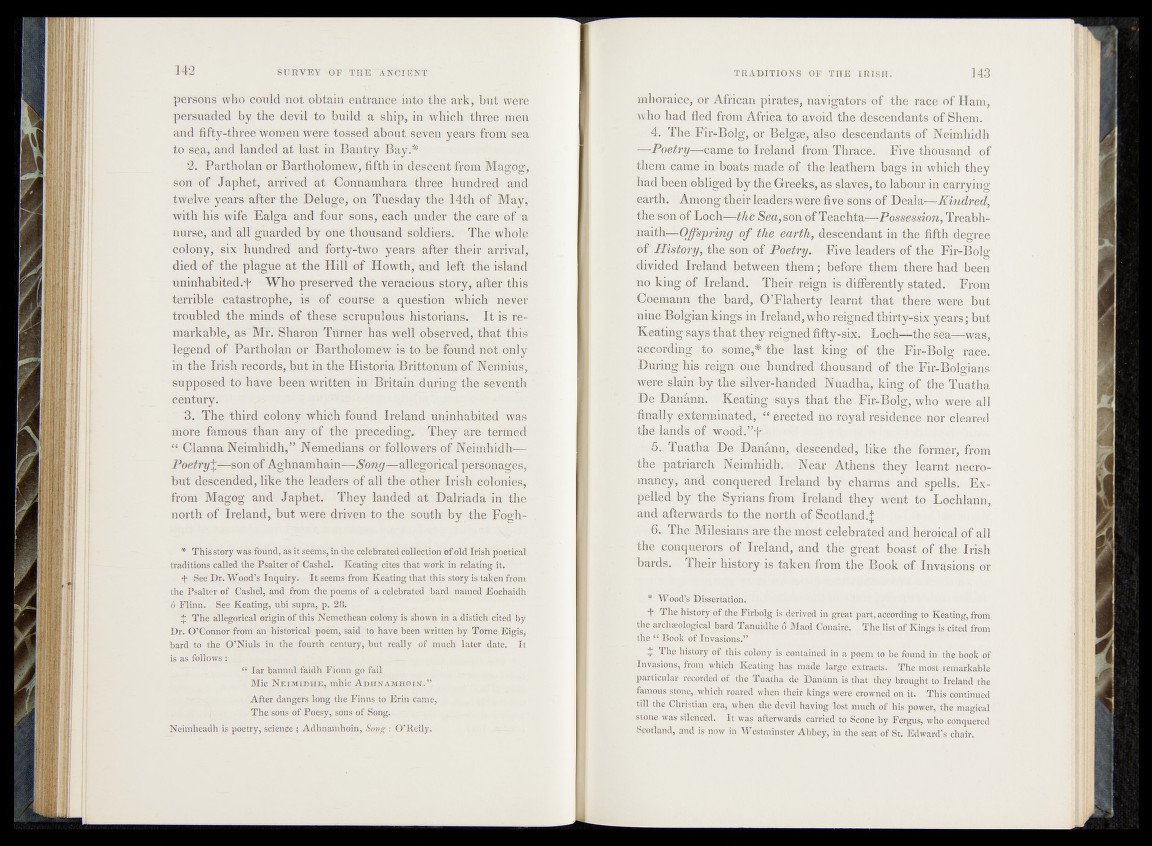
persons who vrould not obtain entrance-into the ark, bilt Were
persuaded#|r the deüfeto build. a ship, in> whictó^three ttïén
and fifty-threerwom-en',»wëre!>toSSe^about %j^^^ygarsvfi’fenvfeea
to sea, and landed at:last in Bantry Bay.*1. -
2. Partholan or Bartholóinew, fifth in-descent frOm^M&gdgy
son HMJ aphet, arrived at Connamhara three - hun d red and
twelve years after thê Deluge^ on Tuesday th e ' 14th’’of May *
with his wife EMga and four sons, each under theJcarerof a
nurse* and all guarded by one thousand soldiers. The’’Whole
c61orty,'six-- hundred and forty-two years after their arrival,
died o f the plague a t the Hill of Howth, and left the island
uninhabited.^ Who preseivod the Veracious story,„after this
terrible Catastrophe, is of course a question which never
trOubfed the minds of these, scrupulous historians, Brik remarkable,
as Mr. Sharon Turner has wéll'ohsëïvëd, that this
i^PBad o# PafthOlaü or Bartholomew is to be found not only
in the Irisli records, but in theHistoria Brittomim of#Merfnins,
supposed to have been Written in Britain during the seventh
Century.
C; 3. The third colony which found Ireland uninhabited was
more famous than any of the preceding.« - They' are termed
3 ^ 0 anna Neimhidh/* Nemedians or followers ©f'j^eitóhidh-k-'
Poetryi—son ofAghnamhain—-«S'ow^r—allegoricalpef soiiagCs,
but d^cendédy like t t e leaders of all the other Irish colonies^
from Magog and Japhet. They landed at Datriada in the
north of Ireland, but were driven to the, south by jth eF o g h -
- * This story was found, as it seenis, in the celebrated collection óf olCIran
-traditions called the Psalter of Cashel.' Keating cites that work jUjelating ftjffl?
•f- See! Dr. Wood's Inquiry. I t seems from Keatingthatthis stnryistaken from
the Psalter of Cashel, and from the poems of a celebrated hard, named Eochaidh
è Flinn. See Keating, uhi supra, p. 28.
+ The allegorical origin of this Nemethean colony is shown in a distich cited by
Dr. O’Connor from an historical poem, said to have been written by Torne Eigis,
hard to the O’Niuls in the fourth century, but really of much later date. It
is as follows
“ Iar bannul faidh Fionn go fail
Mic Ne im id h e , mhic Ahhhamhoih.”
After dangers long the Finns to Erin came,
The sons of Poesy, sons of Song.
Neimheadh-is poetry, science; Adhnamhoin S o n g : O’Reily.
mhoraice-, or African pirates, navigators of the race of Ham,
fwho had flipje from Africa to avoid the descendants of Shem.
* 4. Ifhe^Fir-Bolgyfor Bèlgsep afeovdescendants of Neimhidh
l|b P o e ^ y ^ c am e to»Ireland1 from Thraèer. .Five thousand of
th^n5.%ite jfo, boatstmtóe' Of thedeathern bags in which they
had been, obliged-by the/^rëfefcs^És s la v ^ to labour in carrying
earth. AmOngjiheir leaderswere five>Jsoirs.of' Deala—Kindred,
the-sonïof Loch-^Me Seays'ó.nfèfTeachéaH^Pos^mow, Treabh-
M&ith^Offspring of' the emthty d^lèhdant-in the-fifth degree
of History, sthej^onvof Poetry. Fivëolèadérs of the - Fir-Bolg
dividedkdrelahd« between them 5; befö.r'e thèmkthere had been
no -king^pf ^Ireland. Th^^^reignlis-difïerenfty stafed.? From
'Coemann the bard, ©’'Maherty.^learnt that there -were but
mimelBelgian? hing's'4|ï^rëïand’,2Who*f eig,ned thirty-sixuyears; but
Keating,-says that,»they reigned fifty-six. * Loch—the séa—was,
ipbcordm^tê» -Some,#^the - la st * king of th e - Fir-Bolg jj -race.
Dnring^hTss-reigu.i-onp' hundred thousand ©f the Fir-Bolgians
fwere* ëï^ir|shy the silver-handed Nuadha, king*of the Tuatha
De Danann. Keating-says that th e . FmBolgyWho were-all
finallyKèX$erminated, “ erected no royal!residenceUor cleared
&bédand‘s'«)f wood *
A # T u a th a ^ D e, Danann, descended^ like-the-former, from
:t|'erjpairiare:h1k#eimhidh..v»Meat - Athens they dearnt necro*-
mancyi* and conquered.Ireland k tf chaPmsl'andospellsi Syi
Polled by the||ptyriuns from Ireland they went to Lochlann,
and afterwards-to the north-of Scotland:^-,
. - 46s, The Milesians arethe-most celebrated and heroicalidf all
the conquerors of Ireland, and the great='boast -the Irish
bards. Their history is taken from the Book of Invasions or
^ * Wood’s Dissertation.
^ ‘Thehistory of the Firholg is derived in great part,.according to Keating, from
jtjie archaeological bard, Tanuidhe 6 Maol Cqnaire. The list of Kings is cited from
the “ Book of Invasions.”
t The history of this colony is contained in a poem to be found in the book of
Invasions, from which Keating has made large extracts. The most remarkable
particular recorded of the Tuatha de Danann is that they brought to Ireland the
famous stone, which roared when their kings were crowned on it. This continued
till the Christian, era, when the devil having lost much of .his power, the magical
stone was silenced. It was afterwards carried t& Scone by Fergus, who conquered
Scotland, and is now in Westminster Abbey, in the seat of St. Edward’s chair.